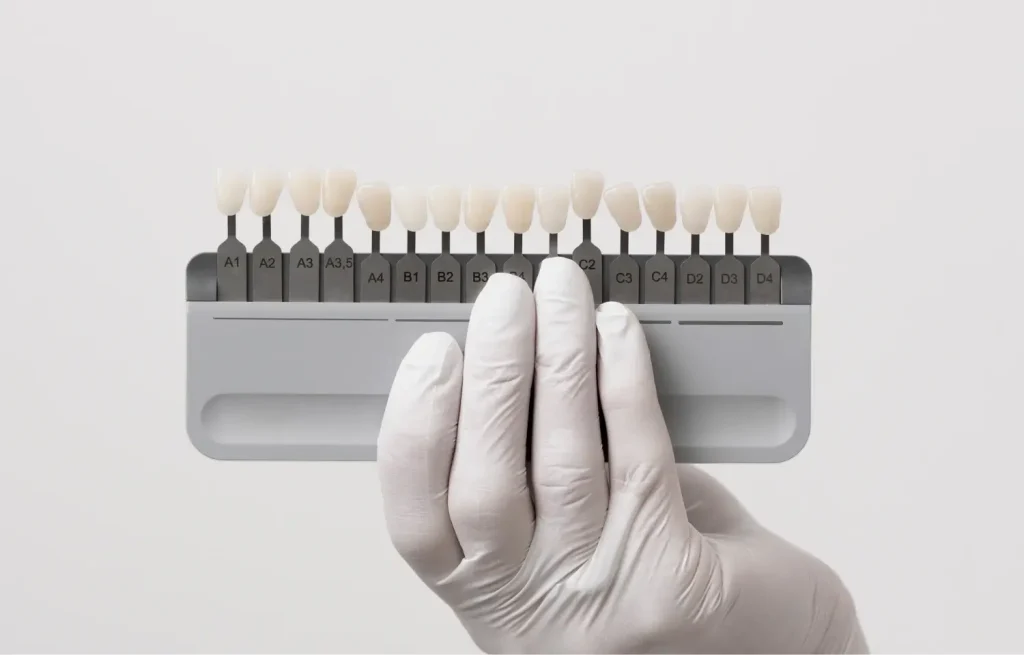Porcelain Vs Composite Veneers: Which Are Better?
15 Dec 2024
Looking for the perfect veneers to transform your smile? Whether you choose composite and porcelain veneers, both can dramatically improve your smile’s appearance and benefit your oral health.
In fact, millions opt for dental veneers each year to correct tooth imperfections like discolored teeth, crooked teeth, and worn enamel.
According to the Mayo Clinic, veneers are one of the most common cosmetic procedures today.
But when deciding between porcelain or composite veneers, which one is the right fit for you? Let’s break it down to help you make an informed choice.
What Are Dental Veneers and Why Are They Used?

Dental veneers are thin, custom-made shells designed to cover the front surface of teeth.
They’re typically made from either porcelain or composite resin. Porcelain veneers are more durable and have a natural, translucent quality, while composite veneers offer a more cost-effective solution.
Veneers are commonly used to fix various dental issues, including crooked teeth, worn enamel, discolored teeth, and uneven teeth.
They also enhance the overall appearance of natural teeth, giving you a flawless smile with minimal tooth structure alteration. Dental veneers are a common procedure in cosmetic dentistry.
What Is the Difference Between Porcelain and Composite Veneers?
When choosing between composite and porcelain veneers, it’s essential to understand the key differences.
Both options improve the appearance of natural teeth, but they differ in materials, application process, and long-term benefits.
Materials: Composite Resin vs. Porcelain
Composite veneers are made from composite material, a mixture of organic and inorganic substances shaped directly onto the teeth.
Conversely, porcelain veneers are thin, custom-made porcelain shells that are bonded to the tooth’s surface. Porcelain is known for its durability and natural appearance.
Application Process

Composite resin veneers can often be applied in a single appointment, making them a quicker option. Direct composite veneers are applied directly to the teeth with minimal invasiveness.
The dentist layers the material onto the tooth and shapes it as needed. Porcelain veneers, however, require more steps, including initial consultation, preparation of the teeth, and custom creation of the veneers, which are then bonded using bonding cement.
Appearance: Natural and Translucent
While both types of veneers improve aesthetics, porcelain veneers stand out for their translucent quality, closely mimicking natural teeth’ appearance.
Unlike porcelain veneers, the resin for composite veneers is applied directly to the tooth, providing a natural look but potentially lacking the depth and light-reflecting properties of their porcelain counterparts.
Stain Resistance and Longevity
One significant difference is stain resistance vs porcelain veneers. Porcelain veneers are highly resistant to stains, maintaining their color over time.
While still effective, composite resin veneers are more prone to staining and may need more frequent touch-ups or replacements.
In short, porcelain veneers offer greater durability, a more natural appearance, and better stain resistance, while composite veneers are quicker and more affordable. Your choice depends on your aesthetic goals and budget.
Which Veneer Option Is More Durable?
When considering veneers, comparing composite veneers vs porcelain veneers plays a significant role in making the right choice. Both porcelain veneers and composite resin veneers can improve your smile, but they vary in strength and longevity.

Material Strength: Porcelain vs. Composite Resin
Porcelain veneers are made from a stronger material than composite resin. This makes them more resistant to chips, cracks, and everyday wear. Composite veneers, while effective, are more prone to damage over time, especially in crooked or uneven teeth.
Bonding Process and Durability
The bonding process also impacts durability. Porcelain veneers are bonded to the tooth using bonding cement and hardened with a high-intensity light, creating a strong and lasting hold.
Composite veneers are applied and shaped directly onto the tooth, but the bond isn’t as strong as their porcelain counterparts.
Stain Resistance and Wear
Porcelain veneers are highly stain-resistant and maintain their color and appearance over time. In contrast, composite veneers are more susceptible to staining and may require polishing or replacements to maintain their look. Proper oral hygiene helps both options last longer, but porcelain retains its beauty with less maintenance.
Longevity of Veneers
On average, porcelain veneers can last 10 to 15 years with proper care, while composite resin veneers typically last 5 to 7 years. The choice depends on whether you prioritize long-term durability or a cost-effective solution.
In terms of durability, porcelain veneers offer superior strength, stain resistance, and longer lifespan compared to composite resin veneers.
For a more durable, long-lasting option, porcelain is the clear winner.
How Long Do Porcelain and Composite Veneers Last?
The lifespan of porcelain and composite veneers differs based on the material and care. While both types offer aesthetic improvements, their longevity depends on a few key factors.
Porcelain Veneers:
These typically last 10-15 years with proper care. Porcelain is more durable, offering long-lasting results with minimal tooth structure wear.
Composite Veneers:
Composite veneers usually last 5-7 years. However, due to wear and staining, they may need more frequent touch-ups.
Oral Hygiene:
Regular brushing, flossing, and dental check-ups are essential to avoid tooth decay and maintain both types of veneers.
Lifestyle Choices:
Avoiding habits like biting hard objects or using teeth as tools can extend the life of dental veneers, particularly the more delicate composite resin ones.
While porcelain veneers last longer than composite veneers, both can provide years of beauty with proper care and attention to oral health.
What Is the Cost of Porcelain vs Composite Veneers?

Porcelain Veneers
Initial Cost: $900 – $2,500 per tooth
Application Time: Multiple visits for customization and bonding
Durability: 10-15 years
Maintenance: Low maintenance, highly stain resistant
Composite Veneers
Initial Cost: $250 – $1,500 per tooth
Application Time: Single Appointment
Durability: 5-7 years
Maintenance: May require more frequent touch-ups and replacements
How Do Veneers Affect Tooth Structure and Oral Health?
Both porcelain and composite veneers can improve your smile and impact your natural tooth structure. Before deciding, understanding how these veneers affect your teeth and oral health is crucial. Temporary veneers can serve as a transitional solution while waiting for permanent veneers.
Tooth Enamel Removal
Both porcelain veneers and composite veneers require some removal of tooth enamel to ensure proper bonding. For porcelain, more enamel is usually removed to fit the veneer perfectly. Composite veneers involve less invasive prep work, preserving more of the natural tooth.
Tooth Structure Preservation
While composite veneers are considered a conservative and smart option due to their minimal prep, even this procedure somewhat alters the tooth’s structure. Porcelain veneers, though longer-lasting, require more significant changes to the tooth’s surface.
Oral Health Considerations
Maintaining good oral health is key when deciding between veneer types. Proper oral hygiene and avoiding tooth decay are critical, regardless of the material, after veneer placement. Ensuring that veneers don’t compromise the integrity of your natural teeth should be a top priority.
Consulting a Cosmetic Dentist
Before proceeding, it’s essential to consult with a cosmetic dentist. They will evaluate your oral health and recommend the best veneer option based on your aesthetic goals and dental issues, ensuring the treatment won’t negatively impact your tooth structure.
While both types of veneers affect tooth enamel, porcelain veneers require more extensive changes. Consulting a cosmetic dentist is essential to ensure the right choice for your long-term oral health and desired results.
Final Thoughts

Both composite veneers and porcelain veneers offer effective ways to enhance your smile. Porcelain veneers provide superior durability, a more natural appearance, and better stain resistance, while composite veneers are a quicker, more cost-effective solution that requires less prep work.
Choosing the right veneers depends on your budget and aesthetic goals. At Greenspoint Dental, our team will help you choose between porcelain or composite veneers based on your needs.
Whether you want the long-lasting look of porcelain or the quicker, cost-effective composite solution, we’ll create a personalized plan for you.
Schedule your consultation today and achieve the smile you’ve always dreamed of.
Related Blog Articles